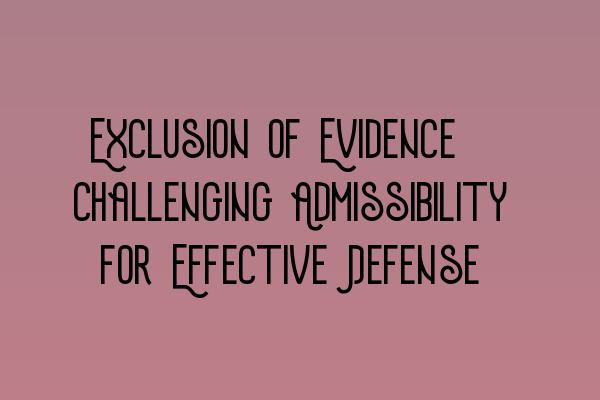Exclusion of Evidence: Challenging Admissibility for Effective Defense
In criminal law, the admissibility of evidence is a critical aspect of ensuring a fair and just legal process. As a defense solicitor, it is your responsibility to challenge the admissibility of evidence presented by the prosecution if there are grounds to do so. This can significantly impact the outcome of a case and can often lead to the exclusion of evidence, which can be a game-changer for your client’s defense.
Before we delve into the various ways to challenge the admissibility of evidence, let’s first understand what it means for evidence to be admissible. Admissible evidence is any evidence that is legally permissible and can be presented before a court. It must meet certain criteria and adhere to procedural rules.
Grounds for Challenging Admissibility
There are several grounds on which you can challenge the admissibility of evidence. These grounds include:
- Relevance: Evidence must be relevant to the case at hand. If you can argue that the evidence is not relevant or has little probative value, you can challenge its admissibility. A thorough analysis of the facts and circumstances of the case is essential in making this argument.
- Hearsay: Hearsay evidence is an out-of-court statement made by someone other than the witness who is testifying. It is usually considered unreliable and can be challenged on this basis. As a defense solicitor, it is crucial to identify and object to any hearsay evidence presented by the prosecution.
- Unlawful Search and Seizure: If the evidence was obtained through an unlawful search and seizure, it may be deemed inadmissible. The Fourth Amendment protects individuals from unreasonable searches and seizures, and any evidence obtained in violation of this constitutional right should be challenged.
- Chain of Custody: The chain of custody refers to the path the evidence takes from the moment it is collected to the moment it is presented in court. Any break or inconsistency in the chain of custody can raise doubts regarding the authenticity and integrity of the evidence, providing grounds for its exclusion.
Procedural Rules to Follow
Challenging the admissibility of evidence requires careful adherence to procedural rules. As a defense solicitor, it is imperative that you follow these rules to ensure your objections are valid:
- Timeliness: Objections to the admissibility of evidence must be raised at the appropriate time during trial. Failure to do so may result in the waiver of the objection.
- Specificity: When objecting to the admissibility of evidence, you must be specific about the grounds on which you are objecting. General objections are less likely to succeed.
- Legal Authority: Backing your objections with relevant legal authority strengthens your argument. Research applicable case law and precedents to support your objections.
Importance of Challenging Admissibility for Effective Defense
Challenging the admissibility of evidence is a crucial part of an effective defense strategy. Excluding evidence that is irrelevant, unreliable, or obtained illegally can significantly weaken the prosecution’s case and strengthen your client’s defense. It can create reasonable doubt in the minds of the jury and increase the chances of a favorable verdict.
Furthermore, challenging the admissibility of evidence demonstrates your dedication to upholding the principles of fairness and justice. It ensures that the evidence presented before the court meets the necessary standards and is reliable.
At SQE Criminal Law & Practice Law UK, we understand the importance of challenging the admissibility of evidence in criminal cases. Our team of experienced solicitors is well-versed in the intricacies of criminal law and can provide you with expert guidance and representation.
If you are preparing for the SQE 1 or SQE 2 exams, be sure to check out our related articles:
- SQE 1 Practice Exam Questions
- SQE 1 Practice Mocks FLK1 FLK2
- SQE 2 Preparation Courses
- SQE 1 Preparation Courses
- SRA SQE Exam Dates
To learn more about our services and how we can assist you with your criminal defense needs, please visit our website or contact us directly. We are here to provide you with the highest level of legal representation and support.
